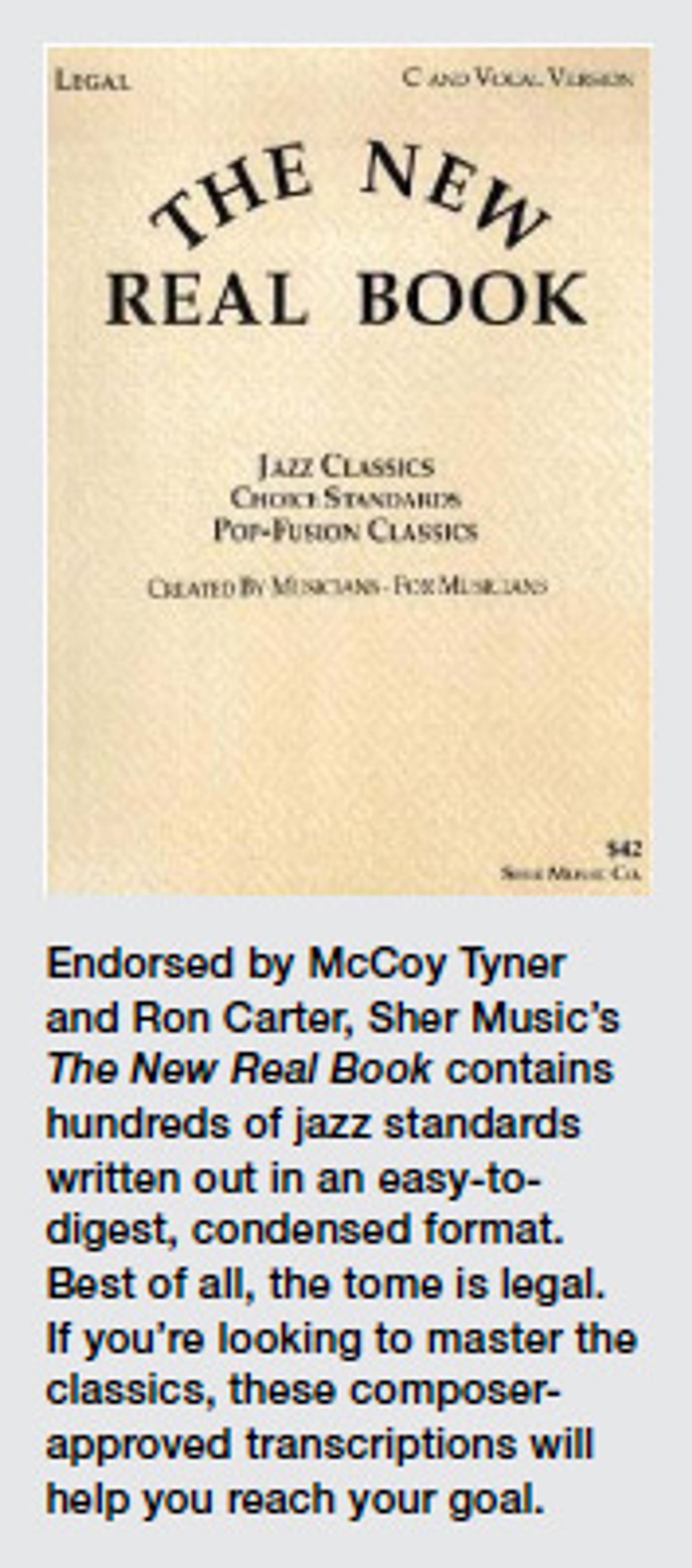
An important consideration for lining up a variety of musical opportunities is the risk involved.
Playing bass fills a good
piece of my non-work
time. For 15 years or so,
I’ve had a regular gig with a
blues band, but the amount
of those gigs has been dwindling,
along with the venues
to play them. I augment that
downtime with a variety of
other gigs on electric bass and
acoustic upright. My plan is
to keep playing bass as long
as my hands, arms, and mind
allow—which requires a bit
of resourcefulness to unearth
other musical opportunities.
An important consideration for lining up a variety of opportunities is the risk involved. Without risk, there’s little chance for growth. Will I get through the gig successfully? A lot of my playing strategy for these one-off gigs is aimed at not getting caught, while also trying to make the most of my musical abilities. I think all of us have moments of doubt and question our ability to get through a gig successfully—those thoughts of being a musical imposter who will be found out as somebody who can’t cut it. Despite a few close calls, things have worked out for me so far by keeping three things in mind.
1. Contribute from your strength. A bad way to avoid getting caught is trying to stay under the radar all the time. When you do that, you’re not contributing to the overall musical enterprise, and you might not get called back. As long as I have been playing bass, I’ve tried to assess my strengths and play to them, so that I’m able to contribute. I’m not a particularly fast player, so I work toward a simpler, solid groove—and stay in a supporting role that the players up front really appreciate.
Likewise, my music reading skills are acceptable, but I can’t always sight-read a part and nail it. Combining these two challenges, I often simplify the written part to bring out its essence. As a rhythm section player, I also pay close attention to the other players, making eye contact with each at some point. I listen for their dynamics and if they’re getting busier in their playing. I try to help keep the tempo steady when things are getting frenzied.
I know I won’t ever be the bass player who steps out with the dazzling solo. But I have the quiet confidence that I’m making a contribution to the group’s musical success by doing what I do best.
2. Do no damage. I learned this idea from a couple of experienced musicians, and it comes out in two ways. The first concerns playing music beyond your ability. If a particularly difficult part comes up—one that I might make a mess of—I try to find a way around it that captures the spirit of what’s called for.
I recently listened to a friend’s recording of a blues trio—guitar, bass, and drums—that was technically very good, but sounded sterile. The bass player was technically capable enough that he could precisely double the guitar player’s lines, but that’s not what blues bass playing is all about. Had I tried to double the guitar lines, I certainly would have done damage. But by simplifying and paraphrasing the basic line, I could avoid doing damage while also providing the bass “glue” that makes the music sound like blues.
A second way of doing damage is the way you get back on track when lost. Simply stopping can do damage and confuse everybody. In these situations, I try to avoid playing any clear root notes that might be misleading, and listen carefully for notes that seem to mesh. I’ll also watch a guitar player’s left hand (a valuable skill for bassists to have), reading the chords being played and hitting the roots if possible. I’ll listen for hints from the drummer that suggest chord changes and phrase endings and look for the beginning of a new verse or chorus. Eventually, things will get back on course and the damage will be minimalized.
3. Study hard. There are lots of resources out there for learning about and preparing for your upcoming bass experiences. Turn to legendary performances on YouTube. Buy a song or album from one of the online MP3 stores. Pick up a few versions of the same song to learn about your musical alternatives.
If you’re facing a reading gig—be it classical, jazz, or whatever—listen to recordings while watching the music. When I do that, complex rhythms get simpler. Hearing the context for a musical line while reading that line really helps. I also own a copy of Band-in-a-Box and can usually find a file with the song I’m after, complete with a passable bass line. If I have multiple performances of the same project, I’ll try to go back and work out a part I may have flubbed. As the old saying goes, practice makes perfect.
So where’s it all going? In the next couple of months, I’ll be pondering how to get through some risky situations as a bassist. My upcoming gigs are widely varied: A chamber orchestra performance, a blues trio at a winery, musical theatre, an outdoor gig with the local uke club, a Real Book jam, a folkie jam party, and more blues gigs. And as I get into these musical opportunities, I’ll keep the above three points in mind, preparing for the next opportunity to arrive.
 Dan Berkowitz
is a professor by day and
a bassist when the sun
goes down. He plays
upright and electric bass
for blues, jazz, orchestra,
and musical theater.
Contact him at profdanb@gmail.com.
Dan Berkowitz
is a professor by day and
a bassist when the sun
goes down. He plays
upright and electric bass
for blues, jazz, orchestra,
and musical theater.
Contact him at profdanb@gmail.com.
An important consideration for lining up a variety of opportunities is the risk involved. Without risk, there’s little chance for growth. Will I get through the gig successfully? A lot of my playing strategy for these one-off gigs is aimed at not getting caught, while also trying to make the most of my musical abilities. I think all of us have moments of doubt and question our ability to get through a gig successfully—those thoughts of being a musical imposter who will be found out as somebody who can’t cut it. Despite a few close calls, things have worked out for me so far by keeping three things in mind.
1. Contribute from your strength. A bad way to avoid getting caught is trying to stay under the radar all the time. When you do that, you’re not contributing to the overall musical enterprise, and you might not get called back. As long as I have been playing bass, I’ve tried to assess my strengths and play to them, so that I’m able to contribute. I’m not a particularly fast player, so I work toward a simpler, solid groove—and stay in a supporting role that the players up front really appreciate.
Likewise, my music reading skills are acceptable, but I can’t always sight-read a part and nail it. Combining these two challenges, I often simplify the written part to bring out its essence. As a rhythm section player, I also pay close attention to the other players, making eye contact with each at some point. I listen for their dynamics and if they’re getting busier in their playing. I try to help keep the tempo steady when things are getting frenzied.
I know I won’t ever be the bass player who steps out with the dazzling solo. But I have the quiet confidence that I’m making a contribution to the group’s musical success by doing what I do best.
2. Do no damage. I learned this idea from a couple of experienced musicians, and it comes out in two ways. The first concerns playing music beyond your ability. If a particularly difficult part comes up—one that I might make a mess of—I try to find a way around it that captures the spirit of what’s called for.
I recently listened to a friend’s recording of a blues trio—guitar, bass, and drums—that was technically very good, but sounded sterile. The bass player was technically capable enough that he could precisely double the guitar player’s lines, but that’s not what blues bass playing is all about. Had I tried to double the guitar lines, I certainly would have done damage. But by simplifying and paraphrasing the basic line, I could avoid doing damage while also providing the bass “glue” that makes the music sound like blues.
A second way of doing damage is the way you get back on track when lost. Simply stopping can do damage and confuse everybody. In these situations, I try to avoid playing any clear root notes that might be misleading, and listen carefully for notes that seem to mesh. I’ll also watch a guitar player’s left hand (a valuable skill for bassists to have), reading the chords being played and hitting the roots if possible. I’ll listen for hints from the drummer that suggest chord changes and phrase endings and look for the beginning of a new verse or chorus. Eventually, things will get back on course and the damage will be minimalized.
3. Study hard. There are lots of resources out there for learning about and preparing for your upcoming bass experiences. Turn to legendary performances on YouTube. Buy a song or album from one of the online MP3 stores. Pick up a few versions of the same song to learn about your musical alternatives.
If you’re facing a reading gig—be it classical, jazz, or whatever—listen to recordings while watching the music. When I do that, complex rhythms get simpler. Hearing the context for a musical line while reading that line really helps. I also own a copy of Band-in-a-Box and can usually find a file with the song I’m after, complete with a passable bass line. If I have multiple performances of the same project, I’ll try to go back and work out a part I may have flubbed. As the old saying goes, practice makes perfect.
So where’s it all going? In the next couple of months, I’ll be pondering how to get through some risky situations as a bassist. My upcoming gigs are widely varied: A chamber orchestra performance, a blues trio at a winery, musical theatre, an outdoor gig with the local uke club, a Real Book jam, a folkie jam party, and more blues gigs. And as I get into these musical opportunities, I’ll keep the above three points in mind, preparing for the next opportunity to arrive.
 Dan Berkowitz
is a professor by day and
a bassist when the sun
goes down. He plays
upright and electric bass
for blues, jazz, orchestra,
and musical theater.
Contact him at profdanb@gmail.com.
Dan Berkowitz
is a professor by day and
a bassist when the sun
goes down. He plays
upright and electric bass
for blues, jazz, orchestra,
and musical theater.
Contact him at profdanb@gmail.com.
